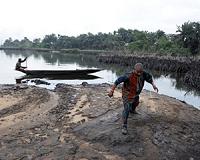 |
Abuja, Nigeria (UPI) Aug 26, 2010 Ongoing political and social strife in Nigeria's delta region continues to affect Royal Dutch Shell's oil extraction efforts. Royal Dutch Shell's major concern remains the militant armed efforts of the Movement for the Emancipation of the Niger Delta, as MEND attacks over the last several years have repeatedly forced Shell to declare force majeure and suspend production. Royal Dutch Shell's latest problems stem from a protest by local women in the Niger Delta's Warri South-West Local Government Area in Escravos demonstrating over the community being bypassed for development, forcing Shell Petroleum Development Co. to shut down its Otumara-Escravos flow station, the Daily Trust reported Thursday. Last week they blocked access to Chevron Corp.'s new Escravos/Warri natural gas pipeline in the area. The women said that they will continue to take possession of major oil facilities on their land until the government enters into meaningful dialogue with the community, giving both the Nigerian government and Royal Dutch Shell a major public relations debacle. Seeking to downplay the issue, Royal Dutch Shell spokesman Tony Okonedo told journalists that some "aggrieved" women in the Ugborodo area of the state seized the flow station and the company is "employing dialogue" to solve the problem, adding, "Dialogue with the women, their community and representatives of the Delta State government continues with a view to resolving the issue." The $800 million Otumara-Escravos flow station is a joint venture project between with the Nigeria National Petroleum Corporation and was designed to produce additional natural gas for the operation of Nigeria's Power Holding Company. Shell Petroleum Development Co., a unit of Royal Dutch Shell PLC, is the largest oil and gas producer in Nigeria. While oil firm royalty along with the sharing of federal oil revenues have provided state governments in the Niger Delta with larger budgets than many West African nations, massive corruption has siphoned off most of the revenue, leaving little for development amid rising social unrest. Local activists are also concerned that more than 50 years of oil extraction have left their remote region of mangrove creeks suffering from massive land and water pollution, which neither the oil companies nor the federal government are making any significant efforts to address. Adding to the public relations unrest, the U.N. Environment Program, while preparing to issue a report announcing that 90 percent of the oil spills in Nigeria's Ogoniland are caused by the locals stealing crude from pipelines, with Royal Dutch Shell's aging pipeline infrastructure responsible for the remaining 10 percent, has belatedly acknowledged that its statistics are based on data from the oil industry and the Nigerian government.
Share This Article With Planet Earth
Related Links Powering The World in the 21st Century at Energy-Daily.com
 UN oil pollution probe in Nigeria will avoid blame
UN oil pollution probe in Nigeria will avoid blameGeneva (AFP) Aug 26, 2010 The UN Environment Programme said Thursday a survey of "devastating" damage caused by a decade of oil spillage in Nigeria will not apportion blame, despite evidence it was partly caused by organised trafficking of crude. A UNEP project leader caused an outcry this month when he said an estimated 90 percent of oil spills in the Niger Delta's Ogoniland region were the result of criminal activi ... read more |
|
| The content herein, unless otherwise known to be public domain, are Copyright 1995-2010 - SpaceDaily. AFP and UPI Wire Stories are copyright Agence France-Presse and United Press International. ESA Portal Reports are copyright European Space Agency. All NASA sourced material is public domain. Additional copyrights may apply in whole or part to other bona fide parties. Advertising does not imply endorsement,agreement or approval of any opinions, statements or information provided by SpaceDaily on any Web page published or hosted by SpaceDaily. Privacy Statement |